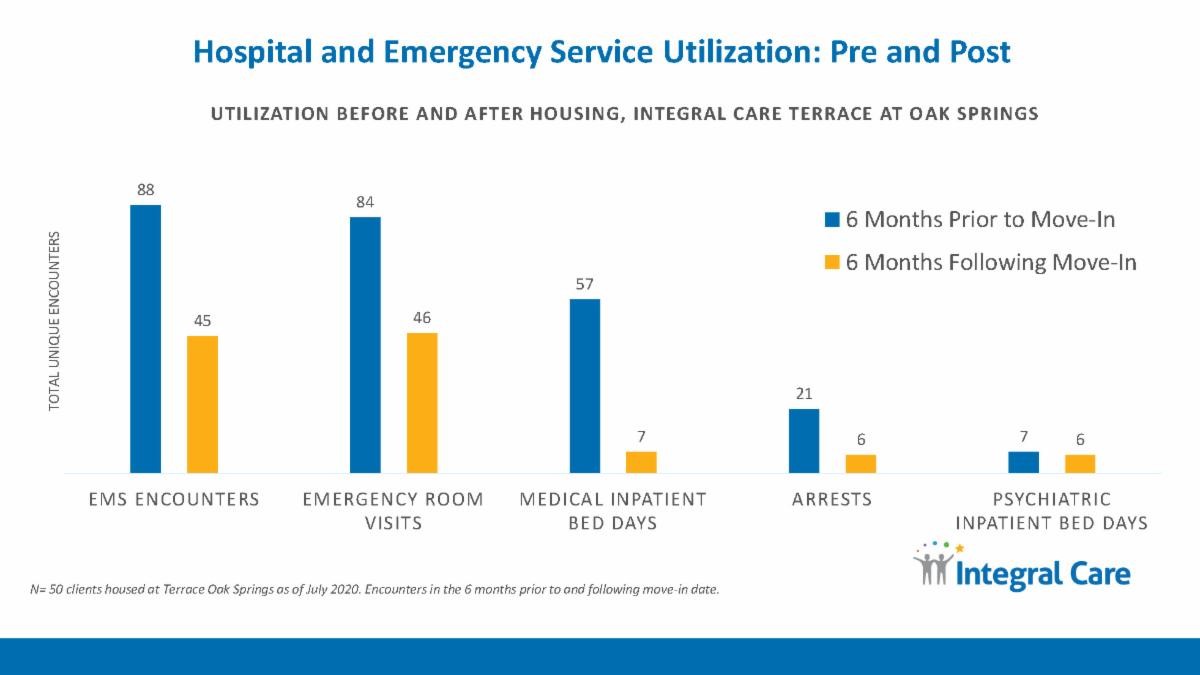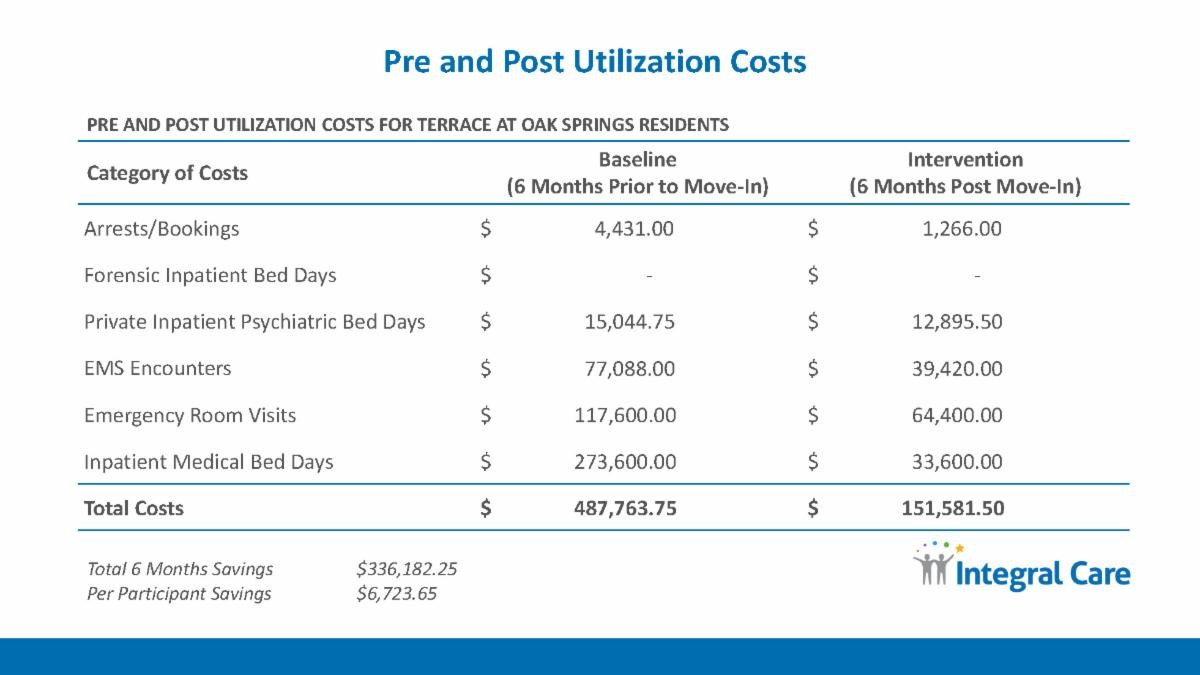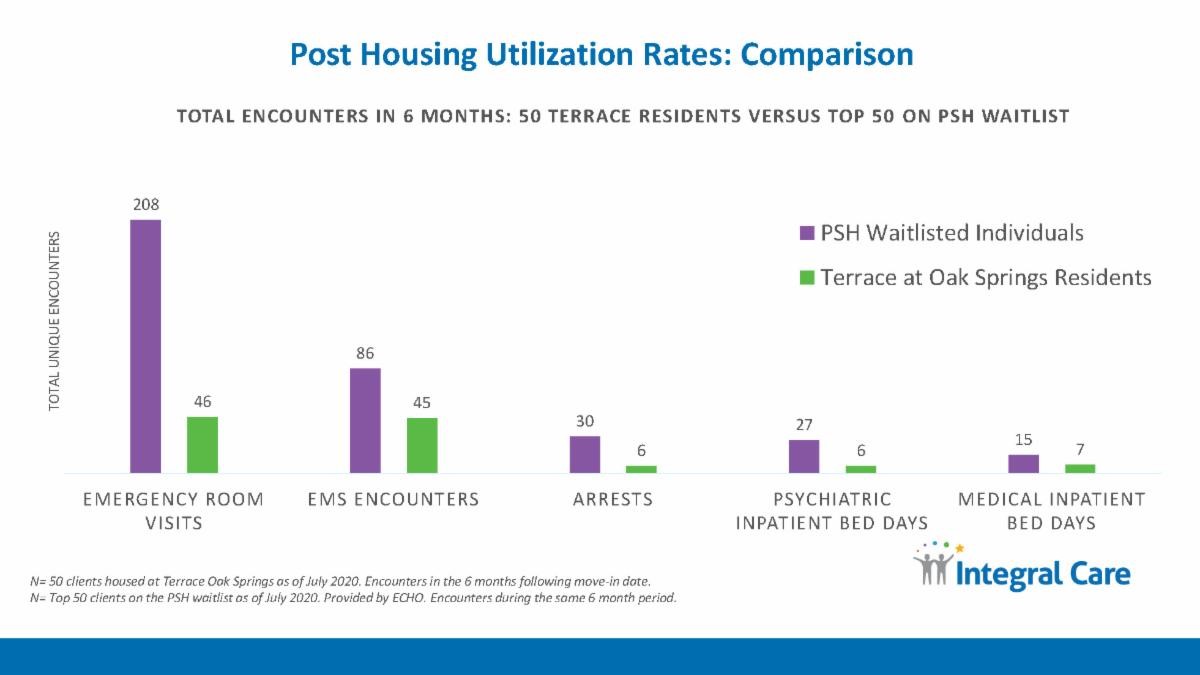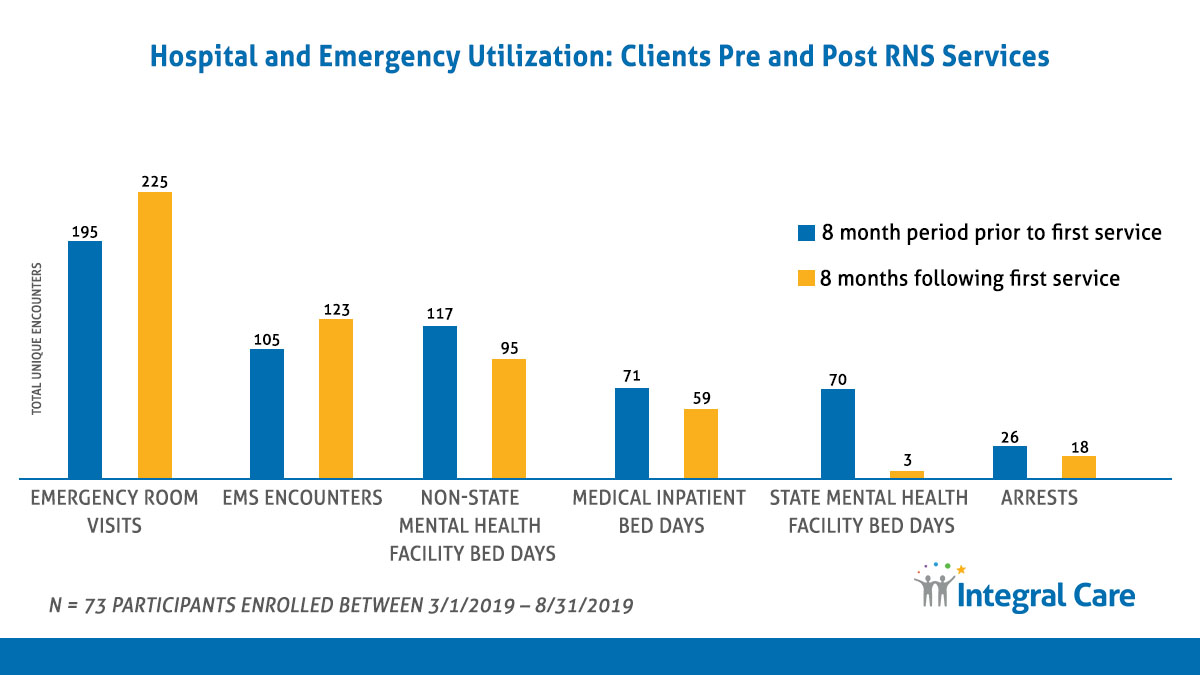TRANSPARENCIES
a monthly newsletter from Integral Care [printfriendly]
a monthly newsletter from Integral Care [printfriendly]

September marks National Recovery Month as well as Suicide Prevention Month, a time to promote the reality that recovery from mental illness and substance use disorder is possible and suicide is preventable. We know that the rate of mental illness, substance use and suicide among the homeless population is greater than among the general public. In fact, the suicide rate is 10 times higher for individuals experiencing homelessness. Integral Care uses housing as a health intervention. With a safe place to live and appropriate support services, recovery from homelessness, mental health issues and substance use disorder begins. Suicides are prevented. People thrive and our community is stronger.
This month is the perfect time to share with you some initial data that shows the success of Terrace at Oak Springs, our Housing First community. The 50 residents have made tremendous progress since making the transition from the streets to a home – in just 6 short months. You also can hear one resident’s journey from homeless to housed on our podcast, Looking Back on the Early Months of Terrace at Oak Springs.
Many of the individuals living at Terrace are often tri-morbid, having mental illness, substance use disorder and chronic health conditions. The graph below compares utilization of health services and interactions with the justice system for individuals who live at Terrace – 6 months prior to moving in compared with 6 months after moving into a home.

We know from experience that this is just the beginning of the journey – the foundation of home will continue to support recovery for the Terrace residents and these numbers will continue to move in a direction that shows their health and stability are growing each day.
The Housing First model offers permanent supportive housing (PSH) to address the needs of individuals experiencing homelessness, who also live with mental illness, substance use disorder and/or other chronic health conditions. The PSH is.
Permanent supportive, a type of affordable housing, includes ongoing support services, such as case management, primary and mental health care, substance use treatment and employment services. This housing model positively impacts public resources as shown in the chart below. We used an average unit cost to calculate the 6 months savings created by the reduced utilization of public resources.

We also compared the individuals living at Terrace with the next 50 individuals who are waiting for permanent supportive housing. In the graph below, the individuals waiting for housing are purple and those living in Terrace are green.

The opening of Terrace is the culmination of years of tireless effort and advocacy – from Integral Care staff, elected officials, community foundations, business leaders and neighbors. Integral Care Foundation kicked off the capital campaign to build Terrace back in 2015. The support of hundreds of donors from across the community including the City of Austin, Mobile Loaves & Fishes, Downtown Austin Alliance, the Rathgeber Foundation, AK Reynolds Foundation, the Moody Foundation and many more, made this possible.
Terrace at Oak Springs Resident Stephen speaking with Darilynn Cardona-Beiler, Division Director of Adult Behavioral Health Systems
The COVID-19 pandemic is affecting a broad range of the general population, and disproportionately individuals experiencing homelessness. But let us take heart in the facts – that recovery is possible and suicide is preventable. As we look to the future with concern for the pandemic’s impact on everyone’s behavioral health, may we be reminded of the success of the residents at Terrace. It’s just one example of how access to substance use treatment, mental health support and suicide prevention services make a difference and help individuals reach their full potential.

David Evans
Chief Executive Officer
One Program Carries Significant Public Cost Savings

Darius Banner SmilingThe return on investment numbers for Integral Care’s Recovery Navigation Services (RNS) says it all. Quickly connecting individuals with substance use disorder to treatment reduces the expensive crisis care these individuals would otherwise utilize, such as emergency medical services, hospital and law enforcement.
In the initial 6 months of the program, we followed the progress of 73 individuals. Their work with RNS resulted in a total public cost savings of $84,380 ($1,156 per person). When those numbers are scaled to 1 year and the full 455 program participants, the savings equals $788,900 ($1,733.85 per person).

Recovery Navigation Services are filling a critical gap in our community. The team quickly connects people with integrated mental health and substance use disorder services at Integral Care or at trusted behavioral healthcare providers in the community. For individuals awaiting intake to long-term treatment, we provide case management, counseling, peer support, psychiatric medication management and a short-term prescription for medication-assisted treatment to bridge the gap. No matter the level of need – inpatient detox, residential treatment, intensive outpatient – the program is proving that with access to treatment, the right tools and ongoing support, everyone has the potential to live a healthy life and reach their full potential.
“I had lost everything using oxycodone. I ended up with the number for Integral Care. I got my first dose of buprenorphine at my first appointment and started seeing a counselor every week. They wouldn’t let me leave without helping me that first day. I’ve come a long way and couldn’t have done it without them. I don’t know where I’d be right now.” – Darius, RNS client
Suicide Prevention Amidst COVID-19

COVID-19 continues to impact the overall health and well-being of Americans. A CDC poll conducted in June revealed that 11% of adults seriously considered suicide in the previous 30 days. Compare this to the 4.3% CDC reported in the 12-month period of 2018. A robust public health system serves as the foundation a community needs to prevent suicides from occurring and provide people the expert supports everyone needs to weather the storm of this pandemic.
Integral Care’s 24/7 Helpline provides around the clock emotional support as well as access to all of our programs and services for adults and children. In FY19, we answered over 69,000 crisis calls. Overall call volume between March and June of this year was up 12%. FEMA and SAMHSA’s Crisis Counseling Assistance and Training Program grant (administered by Texas Health and Human Services) has allowed us to expand helpline capacity to support individuals coping with the impact of COVID-19.
Suicide prevention is an important part of Integral Care’s work. Through our Helpline, we take local calls for the National Suicide Prevention Lifeline, answering over 8,100 calls in FY19. We have also been part of the Zero Suicide in Texas (ZEST) Initiative since September 2014. The foundational belief of Zero Suicide is that suicide deaths for individuals under the care of health and behavioral health systems are preventable. We recently launched an even deeper commitment to enhance the Zero Suicide Framework across the entire agency.
All of us play a role in preventing suicide. Integral Care offers community-wide suicide prevention training and services. We encourage you to take advantage of them and download this quick reference sheet for simple details of how you can help a family member, friend or neighbor who may be having thoughts of suicide.
Community Forum on Substance Use September 22

A global health crisis, an economic recession and a nationwide call for racial equity. How are these major events impacting substance use disorder in our communities? Recent reports show a significant jump in overdoses beginning in February as the pandemic began in the US, including an increase in opioid related deaths. Economic impacts such as unemployment are linked to higher rates of substance use. The current situation poses challenges for people using substances and those in recovery.
Join experts across Travis County for a conversation on substance use disorder in this time of uncertainty. The panel will discuss the signs and symptoms of substance use disorder, circumstances that can contribute to drug and alcohol use, treatment in our current environment, and resources and strategies to maintain recovery. Panelists include: Joy Rucker, Texas Harm Reduction Alliance’s Executive Director, Dr. John Nguyen, Integral Care’s Associate Medical Director and Addictionologist, and Lynda Rhodes, Communities for Recovery Peer Recovery Coordinator. Dr. Kathleen Casey, Integral Care’s Director of Clinical Innovation and Development, will moderate the panel. Register today. The forum will be hosted by Integral Care Foundation.
September 2020: Success Stories of Recovery and Suicide Prevention
August 2020: A Back to School Season Like Never Before
July 2020: Minority Health Disparities & COVID-19
June 2020: Stronger Together
May 2020: Surviving and Thriving During Uncertain Times
April 2020: Persevering During COVID-19
March 2020: Collaborations and Initiatives to Improve Health for the IDD Population
February 2020:Solutions to Health and Health Care Disparities
January 2020: Sucicide Prevention a Local Effort
December 2019: A Year of Thriving Care & Collaboration
November 2019: Teamwork and Collaboration Impact Homelessness in Travis County
October 2019:Making Strides for World Mental Health
September 2019: Taking Steps to Recovery Support
August 2019: Working Together for Child & Youth Mental Health
July 2019: Legislative Wrap-Up – Some Bipartisan Wins for Healthcare
June 2019: Strengthening Access for Veterans and the Entire Military Family
May 2019: Women and Mental Health
April 2019: Legislative Session Status Report
March 2019: Making Opportunities for Recovery More Accessible
February 2019: Recovery is Possible
January 2019: Stronger Outcomes Through Collaboration
December 2018: Looking ahead to the 86th Texas Legislature
November 2018: How Tech is Changing the Face of Mental Health
October 2018: A Few Questions Could Help Save a Life
September 2018: Anyone Can Save a Life
August 2018: A Milestone Moment
July 2018: Equity in Mental Health Care for All
June 2018: Expanding Services for Veterans
May 2018: Your Mental Health Toolkit
April 2018: Time of Terror Calls for Increased Emotional Support
March 2018: Stopping the cycle of incarceration for individuals with mental illness
February 2018: Equity in mental healthcare for everyone
January 2018 : Improving Mental Health Through Partnership & Collaboration
December 2017: Strength Through Community
November 2017 : Healthy Lifestyles Improve Well-Being
October 2017 : National Child Health Day
September 2017 : Strengthening Families and Communities